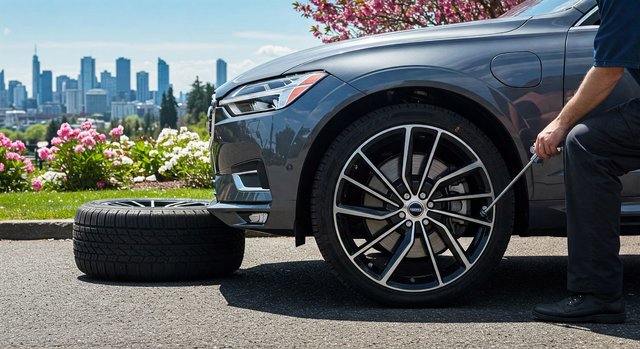As winter approaches, it's essential for Volvo owners to take steps to prepare their vehicles for the colder months. Winter in Canada presents unique challenges that can affect your car's performance, including sub-zero temperatures, ice, and snow. Ensuring your vehicle is winter-ready not only enhances safety but also prolongs its lifespan.
The Importance of Winter Tires
One of the most critical steps in winter preparation is installing winter tires. In many Canadian provinces, winter tires are not just a recommendation but a legal requirement. Unlike all-season tires, winter tires are designed with a special rubber compound that remains flexible even in extremely cold temperatures. This flexibility allows them to maintain better grip and traction on snowy and icy roads. Studies have shown that winter tires can reduce braking distance by up to 25%, making them a worthwhile investment for both safety and vehicle control.
In Volvo cars equipped with the latest all-wheel-drive systems, winter tires become even more effective. The synergistic effect between winter tires and these advanced drive systems enhances your vehicle's overall winter driving capability.
Engine, Battery, and Fluids: The Under-the-Hood Check
Another often overlooked but vital area to focus on is what lies under the hood. Cold weather can adversely affect your car's engine, battery, and fluids, which are essential for optimal performance.
- Battery: Cold temperatures can cause your battery to lose power more quickly. A weakened battery may struggle to start your engine in freezing conditions. Hence, it's advisable to have your battery tested before winter sets in, and if needed, replaced.
- Engine Oil: Low temperatures can make the engine oil thicker, reducing its effectiveness in lubricating the engine components. Consider switching to an oil that has lower viscosity, suitable for winter conditions. Check your Volvo's owner manual for specific recommendations.
- Coolant: Anti-freeze or coolant is essential to keep your engine from freezing. Ensure that the coolant level is up to the mark and consider a 50/50 mix of coolant and water for optimum freezing and boiling protection.
- Washer Fluid: In winter, you'll use your windshield wipers more frequently. Make sure to refill your washer fluid reservoir with a solution that has a lower freezing point.
Proactively preparing your Volvo for winter ensures that you get the best out of your car during the most challenging season of the year. By focusing on these key aspects, you not only guarantee a safer driving experience but also prevent long-term damage, thereby extending the life of your vehicle. If you have any questions or would like professional assistance in getting your Volvo winter-ready, come see us at Morrey Volvo Cars Burnaby or schedule an appointment. We're here to help ensure you navigate the winter months with ease and confidence.




























